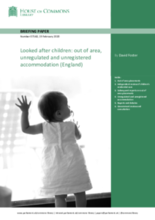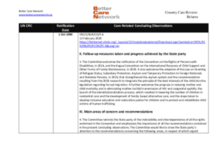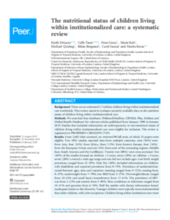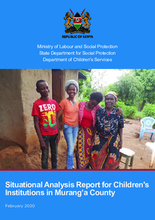Displaying 311 - 320 of 1510
In this study, autobiographical memory tests, working memory, and a depressive symptom assessment were administered to 48 adolescents in care with a history of maltreatment (22 abused and 26 neglected) without mental disorder, who had been removed from their family and were living in residential child care, and to 61 adolescents nonmaltreated who had never been placed in care.
This briefing provides information on two separate but related topics concerning looked after children in England: out of area and distant placements and unregulated and unregistered accommodation
This country care review includes the care related Concluding Observations adopted by the Committee on the Rights of the Child.
This research explains how and why homelessness occurs among youth with serious mental health struggles after aging out of residential and transitional living programmes.
This second of a two-part paper discusses stage two of a two-stage, transatlantic study aimed at identifying and exploring threshold concepts in residential child care.
This review from PeerJ aimed to evaluate currently available data on the nutrition status of children living within institutionalized care.
In this video, the First Minister of Scotland, Nicola Sturgeon, issues a statement on the publication of the final report of the Scottish Independent Care Review.
This first of a two-part paper discusses the first of a two-stage, transatlantic study aimed at identifying and exploring threshold concepts in residential child care.
The purpose of the situational analysis is to provide a snapshot of Charitable Children’s Institutions (CCIs) (registered and unregistered), and Statutory Children’s Institutions (SCIs), and the children living in them in in Murang’a county, Kenya.
Focusing on the life histories of children and young people living in residential care, this study explores the circumstances of their entry into residential care and their interpretations of these experiences.




